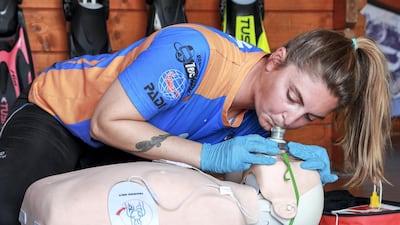Many people choose not to learn cardiopulmonary resuscitation because they fear they could be held responsible if those they help die, instructors have said.
But experts said chest compression and other techniques could save the life of a family member, friend or stranger by keeping them alive until paramedics arrive.
Nicola Liddell, an emergency first response instructor and Professional Association of Diving Instructors (Padi) course director at Divers Down, said a common misconception was that the last person to touch someone in need of help could face prosecution.
This has stopped too many people from learning CPR, she said.
Good Samaritan laws in countries such as the US, UK, Australia, Canada, Germany and Ireland provide legal protection to people who help those they believe to be in peril, at risk of injury or incapacitated.

The UAE is expected to have such a law – the first in the Middle East – introduced this year after it was announced in 2017.
It could not come quickly enough, said Ms Liddell, 30.
“I have heard about people choosing not to help someone who was choking because they were afraid of the consequences,” she said.
“The general thought from people is that if something was happening to someone, they wouldn’t get involved because they might be blamed if that person dies.”
Ms Liddell said there was an urgent need for people from all walks of life to be trained in CPR. "It should be taught to everyone, especially nannies and people who work in nurseries," she said. "Everyone needs to know first aid."
Cleveland Clinic Abu Dhabi has run CPR training classes across the region, including at Abu Dhabi, Yas and Al Sharq malls.
“We’ve had more than 1,000 people taking part in the roadshows so far,” said Dr Jacques Kobersy, chairman of the clinic’s emergency medical institute. “It was gratifying to see so many people coming to learn about CPR.”

Dr Kobersy, 41, said many who took part in the classes had misconceptions about what CPR involved.
“People think you still have to perform mouth-to-mouth but that is not the case any more,” he said. “You need to perform chest compressions as that it is what keeps blood flowing to the brain.”
Dr Kobersy called for more people to receive CPR training.
“It is an easy thing to learn and it is free,” he said. “You never know whose life might need saving.”
_______________
Read more:
Lawyers want ‘Good Samaritans’ protected
Many lives could be saved with better CPR awareness
Boy, 3, saved from drowning in Dubai
_______________
The need for people to be trained in the latest first aid methods is especially urgent on planes. A passenger suffered an epileptic seizure on a British Airways flight from London to Dubai on July 25.
It was the quick thinking of two passengers trained in first aid – a special-needs teacher and a doctor – that helped to bring the crisis under control.
A spokesman for Emirates airline said it trained its staff in latest first-aid techniques.
“All cabin crew receive comprehensive, one-week training in first aid for in-flight medical emergencies,” he said.
“The training is at a higher level compared to most workplace or public first-aid courses available.
“They have to attend annual refresher training to maintain their flying licence.”

